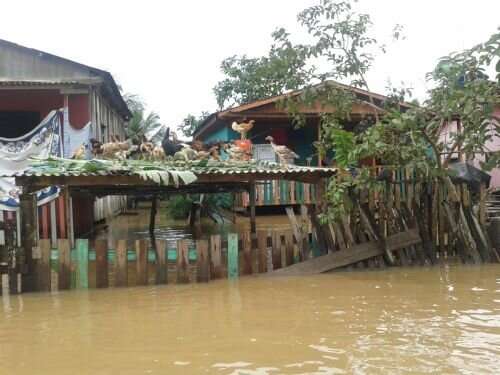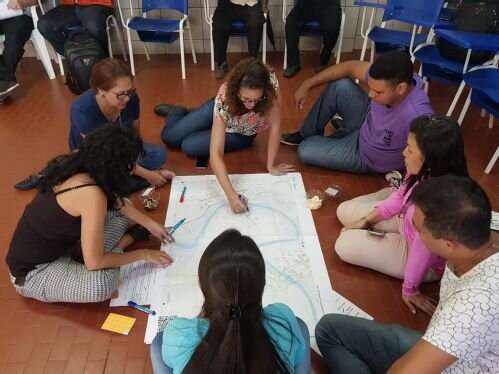Brazilian communities fight floods together – with memories and an app
by University of Warwick

Flooded community in Brazil where the researchers are working. Credit: University of Warwick
Brazilian communities that are vulnerable to devastating floods are being united and empowered to defend themselves, using 'citizen science' and a specially developed mobile app, thanks to two research projects led by the University of Warwick.
Led by Professor João Porto de Albuquerque, researchers are forming a network of citizens of all ages across the country who, together, are collecting and recording data on rainfall and flooding in different regions—leading to more effective flood risk governance at local and at national levels.
In one project, the research team is mobilising 81 schools in Brazil, training students to gauge rainfall levels using the traditional method of measuring rain in bottles. The students will record this data from all their various locations into an app that is being developed by the researchers to collate and centralise the information digitally.
Combining and sharing all this information from local communities will create an effective data tool, which can be used to support and supplement current flood monitoring practices in different regions effectively and in real-time, boosting resilience against weather events throughout the country.
As well as working with schoolchildren, the researchers are also engaging with older people in communities, encouraging them to share their stories of past floods—their memories becoming crucial data that will inform future flood defence, bringing neighbours of different ages together.
Urban flooding is one of the biggest challenges for contemporary Brazilian cities. Its catastrophic impact was shown on the 10th February 2020 in the metropolitan area of São Paulo, when intense, torrential rain paralysed the city.
Professor João Porto de Albuquerque, who is the director of the Institute for Global Sustainable Development at the University of Warwick, said:
"Our research is about transforming the everyday experience and knowledge of individuals into a powerful collection of data—a comprehensive, accurate, up-to-date evidence base about how weather is affecting communities throughout Brazil, which can be used to strengthen local and national flood defence planning.

Brazilian communities that are vulnerable to devastating floods are being united and empowered to defend themselves, using 'citizen science' and a specially developed mobile app, thanks to two research projects led by the University of Warwick.
Led by Professor João Porto de Albuquerque, researchers are forming a network of citizens of all ages across the country who, together, are collecting and recording data on rainfall and flooding in different regions—leading to more effective flood risk governance at local and at national levels.
In one project, the research team is mobilising 81 schools in Brazil, training students to gauge rainfall levels using the traditional method of measuring rain in bottles. The students will record this data from all their various locations into an app that is being developed by the researchers to collate and centralise the information digitally.
Combining and sharing all this information from local communities will create an effective data tool, which can be used to support and supplement current flood monitoring practices in different regions effectively and in real-time, boosting resilience against weather events throughout the country.
As well as working with schoolchildren, the researchers are also engaging with older people in communities, encouraging them to share their stories of past floods—their memories becoming crucial data that will inform future flood defence, bringing neighbours of different ages together.
Urban flooding is one of the biggest challenges for contemporary Brazilian cities. Its catastrophic impact was shown on the 10th February 2020 in the metropolitan area of São Paulo, when intense, torrential rain paralysed the city.
Professor João Porto de Albuquerque, who is the director of the Institute for Global Sustainable Development at the University of Warwick, said:
"Our research is about transforming the everyday experience and knowledge of individuals into a powerful collection of data—a comprehensive, accurate, up-to-date evidence base about how weather is affecting communities throughout Brazil, which can be used to strengthen local and national flood defence planning.

Credit: University of Warwick
"Each one of us has the power to gather and use data that can save lives, but that information is only effective when it is collated and shared in the correct way, and with the right people."
Professor Porto de Albuquerque's team is collaborating with Brazil's National Centre for Natural Disaster Monitoring and Early Warning (CEMADEN) and international partners at Fundacao Getulio Vargas (Brazil) and Heidelberg University (Germany), connecting local communities to centralised authorities, and informing national disaster management processes with the data collected by ordinary people.
"I am delighted that our partners at CEMADEN are using the citizen data to inform their policies," said Professor Porto de Albuquerque. "This gives a voice to the most affected people in major national processes of environmental planning, benefitting the country as a whole, and the individuals who now have agency to protect their own communities."
The project is not just about collecting data to save lives. A principal focus for the researchers is spreading awareness of the most effective and simple ways in which communities can work together to make themselves less vulnerable to social and environmental menaces—using the abilities and the knowledge that each citizen already possesses.
Guidelines and materials for creating local awareness and building flood resilience will be developed by the researchers and circulated amongst schools, citizens, and stakeholders.
Professor Porto de Albuquerque commented: "Establishing a more robust defence against flooding is hugely important, and equally crucial to this project is raising awareness of how neighbours can come together, listen to each other's experiences, share information effectively, and collaborate to make their communities more resilient against any natural threats."
Dr. Liana Anderson, from Cemaden, a federal research unit from the Ministry of Science and Technology, commented: "In the process of co-collecting and sharing data with citizens, we advance the scientific knowledge and the technical development for societal benefits in three distinct pathways. First, we can better understand how the citizens perceive the risk they are exposed to and the short and long term impacts that these events causes to their lives.
"Secondly, together with citizens and local institutions we can better think about best practices on how we, as a federal institution responsible for monitoring and issuing warnings of disasters, can communicate the risk and the potential impacts to the society.
"Finally, with a robust technological product, the app, we can gain scale and reach other regions of Brazil, strengthening the network and communication among scientists, communities and local and regional institutions. Moreover, this project will contribute to the understanding of the multi-dimensions of the societal vulnerabilities from the communities that live in flood prone areas, which is useful for subsidizing Cemaden´s decision making process for improving our warnings."
Explore furtherResearchers find collaborative flood modeling process effective
"Each one of us has the power to gather and use data that can save lives, but that information is only effective when it is collated and shared in the correct way, and with the right people."
Professor Porto de Albuquerque's team is collaborating with Brazil's National Centre for Natural Disaster Monitoring and Early Warning (CEMADEN) and international partners at Fundacao Getulio Vargas (Brazil) and Heidelberg University (Germany), connecting local communities to centralised authorities, and informing national disaster management processes with the data collected by ordinary people.
"I am delighted that our partners at CEMADEN are using the citizen data to inform their policies," said Professor Porto de Albuquerque. "This gives a voice to the most affected people in major national processes of environmental planning, benefitting the country as a whole, and the individuals who now have agency to protect their own communities."
The project is not just about collecting data to save lives. A principal focus for the researchers is spreading awareness of the most effective and simple ways in which communities can work together to make themselves less vulnerable to social and environmental menaces—using the abilities and the knowledge that each citizen already possesses.
Guidelines and materials for creating local awareness and building flood resilience will be developed by the researchers and circulated amongst schools, citizens, and stakeholders.
Professor Porto de Albuquerque commented: "Establishing a more robust defence against flooding is hugely important, and equally crucial to this project is raising awareness of how neighbours can come together, listen to each other's experiences, share information effectively, and collaborate to make their communities more resilient against any natural threats."
Dr. Liana Anderson, from Cemaden, a federal research unit from the Ministry of Science and Technology, commented: "In the process of co-collecting and sharing data with citizens, we advance the scientific knowledge and the technical development for societal benefits in three distinct pathways. First, we can better understand how the citizens perceive the risk they are exposed to and the short and long term impacts that these events causes to their lives.
"Secondly, together with citizens and local institutions we can better think about best practices on how we, as a federal institution responsible for monitoring and issuing warnings of disasters, can communicate the risk and the potential impacts to the society.
"Finally, with a robust technological product, the app, we can gain scale and reach other regions of Brazil, strengthening the network and communication among scientists, communities and local and regional institutions. Moreover, this project will contribute to the understanding of the multi-dimensions of the societal vulnerabilities from the communities that live in flood prone areas, which is useful for subsidizing Cemaden´s decision making process for improving our warnings."
Explore furtherResearchers find collaborative flood modeling process effective
Provided by University of Warwick
No comments:
Post a Comment